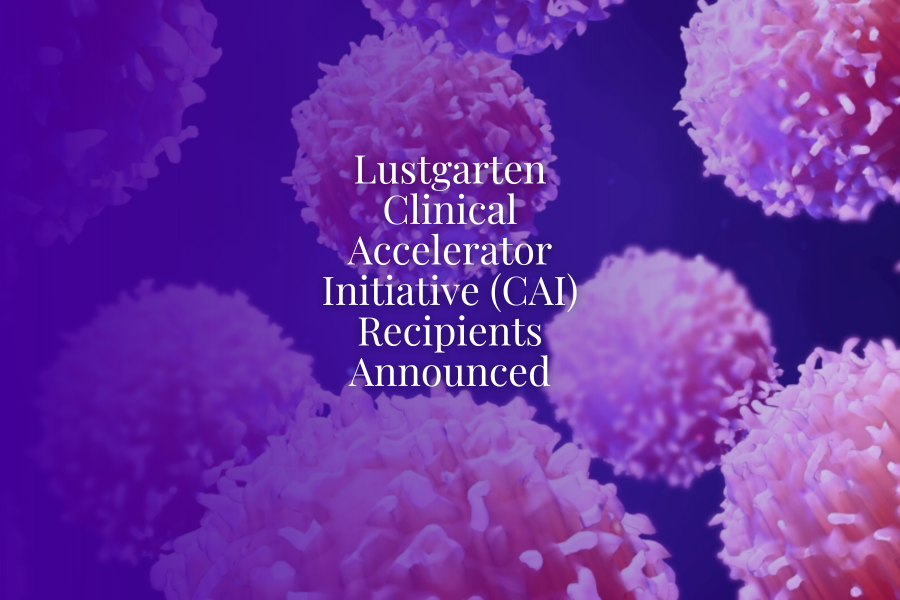Lustgarten Clinical Accelerator Initiative (CAI) Recipients Announced
Topic: Hide on Homepage, News, Pancreatic Cancer News, Press Releases

CAI grants awarded to Gregory Beatty, MD, PhD, Dung Le, MD, and Kevin Soares, MD
UNIONDALE, N.Y., February 7, 2025 — The Lustgarten Foundation has announced three new Dr. Robert F. Vizza Lustgarten Clinical Accelerator Initiative (CAI) grants awarded to Gregory Beatty, MD, PhD, Associate Professor of Medicine (Hematology-Oncology) at the University of Pennsylvania Perelman School of Medicine for his study “Combinatorial myeloid activation as immunotherapy for metastatic pancreatic cancer,” Dung Le, MD, Professor of Oncology at Johns Hopkins University School of Medicine for her study “NC410 and FOLFIRINOX in Combination with Anti-PD-1 with and without Anti-CTLA-4 for Treatment Naive Metastatic Pancreatic Cancer,” and Kevin C. Soares, MD, Assistant Attending Surgeon of Hepatopancreatobiliary Surgery at Memorial Sloan Kettering Cancer Center (MSK) for his study “A Pilot Study of Neoadjuvant mFOLFIRINOX and ELI-002 7P with or without Anti-PD-1 Checkpoint Blockade in Borderline and Resectable Pancreatic Ductal Adenocarcinoma.” Lustgarten’s CAI speeds the translation of basic research into the clinic by supporting novel, science-driven clinical trials.

“We extend our gratitude to the Lustgarten Foundation for their generosity,” said Dr. Beatty. “In this study, we will explore innovative approaches to activate the immune system to recognize and attack pancreatic cancer cells, giving patients hope for improved treatment options and outcomes.”
Beatty’s team will test a new combination immunotherapy approach bringing together two drugs, one targeting CD40 and the other targeting Dectin-1, to activate the immune system against pancreatic cancer. Encouraging results from laboratory experiments and early human trials suggest that this combination may improve outcomes for patients with advanced pancreatic cancer. The study will enroll 50 patients with advanced pancreatic cancer to receive the drug combination, monitor tumor growth and safety, and analyze how the treatment impacts the immune system and tumor environment. The team will analyze blood and tumor samples to reveal how the treatment affects the immune system and tumor environment, identify why some patients respond better, and guide personalized pancreatic cancer therapies.
The Clinical Accelerator Initiative produces highly collaborative clinical trials with innovative, science-driven, efficient designs, using a Lustgarten-developed process based on real-time peer-review feedback. Trials funded through the CAI deeply focus on translational analysis to rapidly further our understanding of disease biology and treatment mechanisms. These “smarter” clinical trials generate large volumes of data that scientists use to help inform and improve current and future clinical trials and expedite new treatments.

“Funding from the Lustgarten Foundation will allow us to more rapidly advance our understanding of pancreatic cancer immunology,” said Dr. Le. “In this case, we are developing novel immune regulation strategies in combination with other immune stimulatory approaches and standard chemotherapy to better understand how to use novel strategies with our current most effective therapies.”
Le and team are investigating the efficacy of immunotherapy combinations with a FOLFIRINOX chemotherapy backbone in controlling metastatic pancreatic cancer and stimulating the immune system to recognize cancer cells. NC410, a fusion protein, targets tumor collagen to release immune cells suppressed by collagen-LAIR-1 interactions, enhancing their ability to fight cancer. This study will enroll 20 patients in two treatment arms combining FOLFIRINOX, NC410, and checkpoint inhibitors (nivolumab with or without ipilimumab). The primary goal is to assess the safety and immune effects of these combinations in metastatic pancreatic cancer.
Cancer immunotherapy is the use of the immune system to prevent or treat cancer. Unlike chemotherapy or radiation, it is a type of treatment that boosts the body’s natural defenses to fight cancer. It uses substances made by the body or in a laboratory to improve or restore immune system function. Through this therapy, the immune system is guided to attack and kill the cancer cells. Immunotherapy has been very successful in treating other types of cancer, which is why pancreatic cancer experts believe it has promise.

“Pancreatic ductal adenocarcinoma (PDAC) is highly lethal with an overall relative 5-year survival rate at just 13%,” said Dr. Soares. “Thanks to the Lustgarten Foundation’s support, we will evaluate whether a pancreas cancer vaccine in combination with standard chemotherapy can produce an immune response against pancreatic cancer – an approach that remains an unmet need for PDAC.”
Soares, along with co-investigator Eileen O’Reilly, Professor of Medicine, Solid Tumor Oncology at Memorial Sloan Kettering Cancer Center, are leading a multi-institutional trial that will evaluate the safety and efficacy of ELI-002 7P, an anti-KRAS vaccine, combined with chemotherapy, with or without anti-PD-1 therapy, in 20 patients with resectable or borderline resectable PDAC. Mutated KRAS, a gene that produces a protein involved in regulating cell division and growth, is found in 90% of pancreatic cancers and is considered a critical driver of pancreatic cancer. Patients will receive treatment before surgery and for 18 months after, with blood and tissue samples collected to assess immune responses and tumor changes. They will compare the immunogenicity between the groups with and without anti-PD1, as well as correlate immune responses and clinical outcomes. Data from this study will also be analyzed by a team assembled through a collaboration between the Lustgarten Foundation and Break Through Cancer’s Demystifying Pancreatic Cancer Therapies TeamLab, which is dedicated to investigating how the pancreatic cancer tumor microenvironment helps malignant cells survive chemotherapy and immunotherapy.
Learn more about the Lustgarten Foundation’s Dr. Robert F. Vizza Lustgarten Clinical Accelerator Initiative (CAI) HERE.
Lustgarten now supports 12 active CAI grants, investing nearly $20M in these “smarter” clinical trials. Learn more about funded trials in Research Matters, our annual publication that showcases our progress, and HERE.

